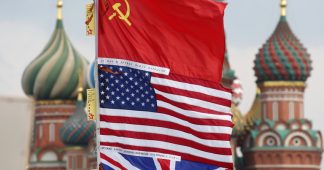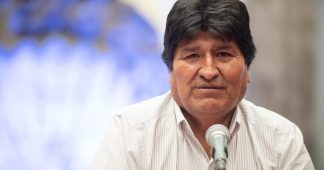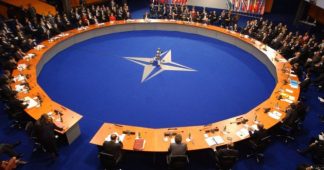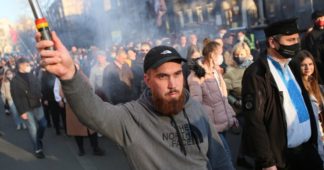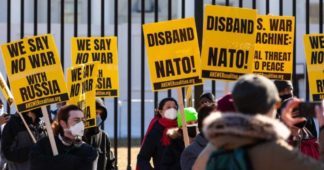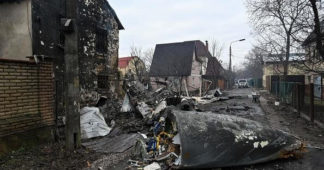The formation of the North Atlantic Treaty Organization (NATO) and the rearmament of Germany confirmed that for the United States, the war in Europe was not entirely over. It still isn’t.
By Diana Johnstone*
March 16, 2022
It goes on and on. The “war to end war” of 1914-1918 led to the war of 1939-1945, known as World War II. And that one has never ended either, mainly because for Washington, it was the Good War, the war that made The American Century: why not the American Millenium?
The conflict in Ukraine may be the spark that sets off what we already call World War III.
But this is not a new war. It is the same old war, an extension of the one we call World War II, which was not the same war for all those who took part.
The Russian war and the American war were very, very different.
Russia’s World War II
For Russians, the war was an experience of massive suffering, grief and destruction. The Nazi invasion of the Soviet Union was utterly ruthless, propelled by a racist ideology of contempt for the Slavs and hatred of “Jewish Bolsheviks.” An estimated 27 million died, about two thirds of them civilians. Despite overwhelming losses and suffering, the Red Army succeeded in turning the Nazi tide of conquest that had subdued most of Europe.
This gigantic struggle to drive the German invaders from their soil is known to Russians as the Great Patriotic War, nourishing a national pride that helped console the people for all they had been through. But whatever the pride in victory, the horrors of the war inspired a genuine desire for peace.
America’s World War II
America’s World War II (like World War I) happened somewhere else. That is a very big difference. The war enabled the United States to emerge as the richest and most powerful nation on earth. Americans were taught never to compromise, neither to prevent war (“Munich”) nor to end one (“unconditional surrender” was the American way). Righteous intransigence was the fitting attitude of Good in its battle against Evil.
The war economy brought the U.S. out of the depression. Military Keynesianism emerged as the key to prosperity. The Military-Industrial-Complex was born. To continue providing Pentagon contracts to every congressional constituency and guaranteed profits to Wall Street investors, it needed a new enemy. The Communist scare – the very same scare that had contributed to creating fascism – did the trick.
The Cold War: World War II Continued
In short, after 1945, for Russia, World War II was over. For the United States, it was not. What we call the Cold War was its voluntary continuation by leaders in Washington. It was perpetuated by the theory that Russia’s defensive “Iron Curtain” constituted a military threat to the rest of Europe.
At the end of the war, the main security concern of Stalin was to prevent such an invasion from ever happening again. Contrary to Western interpretations, Moscow’s ongoing control of Eastern European countries it had occupied on its way to victory in Berlin was not inspired so much by communist ideology as by determination to create a buffer zone as an obstacle to repeated invasion from the West.
Stalin respected the Yalta lines between East and West and declined to support the life and death struggle of Greek communists. Moscow cautioned leaders of large Western European Communist Parties to eschew revolution and play by the rules of bourgeois democracy. The Soviet occupation could be brutal but was resolutely defensive. Soviet sponsorship of peace movements was perfectly genuine.
The formation of the North Atlantic Treaty Organization (NATO) and the rearmament of Germany confirmed that for the United States, the war in Europe was not entirely over. The lackadaisical U.S. “de-Nazification” of its sector of occupied Germany was accompanied by an organized brain drain of Germans who could be useful to the United States in its rearmament and espionage (from Wernher von Braun to Reinhard Gehlen).
America’s Ideological Victory
Throughout the Cold War, the United States devoted its science and industry to building a gigantic arsenal of deadly weapons, which wreaked devastation without bringing U.S. victory in Korea or Vietnam. But military defeat did not cancel America’s ideological victory.
The greatest triumph of American imperialism has been in spreading its self-justifying images and ideology, primarily in Europe. The dominance of the American entertainment industry has spread its particular blend of self-indulgence and moral dualism around the world, especially among youth. Hollywood convinced the West that World War II was won essentially by the U.S. forces and their allies in the Normandy invasion.
America sold itself as the final force for Good as well as the only fun place to live. Russians were drab and sinister.
In the Soviet Union itself, many people were not immune to the attractions of American self-glorification. Some apparently even thought that the Cold War was all a big misunderstanding, and that if we are very nice and friendly, the West will be nice and friendly too. Mikhail Gorbachev was susceptible to this optimism.
Former U.S. ambassador to Moscow Jack Matlock recounts that the desire to liberate Russia from the perceived burden of the Soviet Union was widespread within the Russian elite in the 1980s. It was the leadership rather than the masses who accomplished the self-destruction of the Soviet Union, leaving Russia as the successor state, with the nuclear weapons and U.N. veto of the U.S.S.R. under the alcohol-soaked presidency of Boris Yeltsin – and overwhelming U.S. influence during the 1990s.
The New NATO
Russia’s modernization over the past three centuries has been marked by controversy between “Westernizers” – those who see Russia’s progress in emulation of the more advanced West – and “Slavophiles,” who consider that the nation’s material backwardness is compensated by some sort of spiritual superiority, perhaps based in the simple democracy of the traditional village.
In Russia, Marxism was a Westernizing concept. But official Marxism did not erase admiration for the “capitalist” West and in particular for America. Gorbachev dreamed of “our common European home” living some sort of social democracy. In the 1990s, Russia asked only to be part of the West.
What happened next proved that the whole “communist scare” justifying the Cold War was false. A pretext. A fake designed to perpetuate military Keynesianism and America’s special war to maintain its own economic and ideological hegemony.
There was no longer any Soviet Union. There was no more Soviet communism. There was no Soviet bloc, no Warsaw Pact. NATO had no more reason to exist.
But in 1999, NATO celebrated its 50th anniversary by bombing Yugoslavia and thereby transforming itself from a defensive to an aggressive military alliance. Yugoslavia had been non-aligned, belonging neither to NATO nor the Warsaw Pact. It threatened no other country. Without authorization from the Security Council or justification for self-defense, the NATO aggression violated international law.
At the very same time, in violation of unwritten but fervent diplomatic promises to Russian leaders, NATO welcomed Poland, Hungary and the Czech Republic as new members. Five years later, in 2004, NATO took in Romania, Bulgaria, Slovakia, Slovenia and the three Baltic Republics. Meanwhile, NATO members were being dragged into war in Afghanistan, the first and only “defense of a NATO member” – namely, the United States.
Understanding Putin – Or Not
Meanwhile, Vladimir Putin had been chosen by Yeltsin as his successor, partly no doubt because as a former KGB officer in East Germany he had some knowledge and understanding of the West. Putin pulled Russia out of the shambles caused by Yeltsin’s acceptance of American-designed economic shock treatment.
Putin put a stop to the most egregious rip-offs, incurring the wrath of dispossessed oligarchs who used their troubles with the law to convince the West that they were victims of persecution (example: the ridiculous Magnitsky Act).
On Feb. 11, 2007, the Russian Westernizer Putin went to a center of Western power, the Munich Security Conference, and asked to be understood by the West. It is easy to understand, if one wants to. Putin challenged the “unipolar world” being imposed by the United States and emphasized Russia’s desire to “interact with responsible and independent partners with whom we could work together in constructing a fair and democratic world order that would ensure security and prosperity not only for a select few, but for all.”
The reaction of the leading Western partners was indignation, rejection, and a 15-year media campaign portraying Putin as some sort of demonic creature.
Indeed, since that speech there have been no limits to Western media’s insults directed at Putin and Russia. And in this scornful treatment we see the two versions of World War II. In 2014, world leaders gathered in Normandy to commemorate the 70th anniversary of the D-Day landings by U.S. and British forces.
In fact, that 1944 invasion ran into difficulties, even though German forces were mainly concentrated on the Eastern front, where they were losing the war to the Red Army. Moscow launched a special operation precisely to draw German forces away from the Normandy front. Even so, Allied progress could not beat the Red Army to Berlin.
However, thanks to Hollywood, many in the West consider D-Day to be the decisive operation of World War II. To honor the event, Vladimir Putin was there and so was German Chancellor Angela Merkel.
Then, in the following year, world leaders were invited to a lavish victory parade held in Moscow celebrating the 70th anniversary of the end of World War II. Leaders of the United States, Britain and Germany chose not to participate.
This was consistent with an endless series of Western gestures of disdain for Russia and its decisive contribution to the defeat of Nazi Germany (it destroyed 80 percent of the Wehrmacht.) On Sept. 19, 2019, the European Parliament adopted a resolution on “the importance of European remembrance for the future of Europe” which jointly accused the Soviet Union and Nazi Germany of unleashing World War II.
Vladimir Putin responded to this gratuitous affront in long article on “The Lessons of World War II” published in English in The National Interest on the occasion of the 75th anniversary of the end of the war. Putin answered with a careful analysis of the causes of the war and its profound effect on the lives of the people trapped in the murderous 872-day Nazi siege of Leningrad (now Saint Petersburg), including his own parents whose two-year-old son was one of the 800,000 who perished.
Clearly, Putin was deeply offended by continual Western refusal to grasp the meaning of the war in Russia. “Desecrating and insulting the memory is mean,” Putin wrote. “Meanness can be deliberate, hypocritical and pretty much intentional as in the situation when declarations commemorating the 75th anniversary of the end of the Second World War mention all participants in the anti-Hitler coalition except for the Soviet Union.”
And all this time, NATO continued to expand eastward, more and more openly targeting Russia in its massive war exercises on its land and sea borders.
The U.S. Seizure of Ukraine
The encirclement of Russia took a qualitative leap ahead with the 2014 seizure of Ukraine by the United States. Western media recounted this complex event as a popular uprising, but popular uprisings can be taken over by forces with their own aims, and this one was. The elected president Viktor Yanukovych was overthrown by violence a day after he had agreed to early elections in an accord with European leaders.
Billions of U.S. dollars and murderous shootings by extreme right militants enforced a regime change openly directed by U.S. Assistant Secretary of State Victoria Nuland (“F___ the EU”) producing a leadership in Kiev largely selected in Washington, and eager to join NATO.
By the end of the year, the government of “democratic Ukraine” was largely in the hands of U.S.-approved foreigners. The new minister of finance was a U.S. citizen of Ukrainian origin, Natalia Jaresko, who had worked for the State Department before going into private business. The minister of economy was a Lithuanian, Aïvaras Arbomavitchous, a former basketball champion. The ministry of health was taken by a former Georgian minister of health and labor, Sandro Kvitachvili.
Later, disgraced former Georgian president Mikheil Saakashvili was called in to take charge of the troubled port of Odessa. And Vice President Joe Biden was directly involved in reshuffling the Kiev cabinet as his son, Hunter Biden, was granted a profitable position with the Ukrainian gas company Barisma.
The vehemently anti-Russian thrust of this regime change aroused resistance in the southeastern parts of the country, largely inhabited by ethnic Russians. Eight days after more than 40 protesters were burned alive in Odessa, the provinces of Lugansk and Donetsk moved to secede in resistance to the coup
The U.S.-installed regime in Kiev then launched a war against the provinces that continued for eight year, killing thousands of civilians.
And a referendum then returned Crimea to Russia. The peaceful return of Crimea was obviously vital to preserve Russia’s main naval base at Sebastopol from threatened NATO takeover. And since the population of Crimea had never approved the peninsula’s transfer to Ukraine by Nikita Khrushchev in 1954, the return was accomplished by a democratic vote, without bloodshed. This was in stark contrast to the detachment of the province of Kosovo from Serbia, accomplished in 1999 by weeks of NATO bombing.
But to the United States and most of the West, what was a humanitarian action in Kosovo was an unforgivable aggression in Crimea.
The Oval Office Back Door to NATO
Russia kept warning that NATO enlargement must not encompass Ukraine. Western leaders vacillated between asserting Ukraine’s “right” to join whatever alliance it chose and saying it would not happen right away. It was always possible that Ukraine’s membership would be vetoed by a NATO member, perhaps France or even Germany.
But meanwhile, on Sept. 1, 2021, Ukraine was adopted by the White House as Washington’s special geo-strategic pet. NATO membership was reduced to a belated formality. A Joint Statement on the U.S.-Ukraine Strategic Partnership issued by the White House announced that “Ukraine’s success is central to the global struggle between democracy and autocracy” – Washington’s current self-justifying ideological dualism, replacing the Free World versus Communism.
It went on to spell out a permanent casus belli against Russia:
“In the 21st century, nations cannot be allowed to redraw borders by force. Russia violated this ground rule in Ukraine. Sovereign states have the right to make their own decisions and choose their own alliances. The United States stands with Ukraine and will continue to work to hold Russia accountable for its aggression. America’s support for Ukraine’s sovereignty and territorial integrity is unwavering.”
The Statement also clearly described Kiev’s war against Donbass as a “Russian aggression.” And it made this uncompromising assertion: “The United States does not and will never recognize Russia’s purported annexation of Crimea…” (my emphasis). This is followed by promises to strengthen Ukraine’s military capacities, clearly in view of recovery of Donbass and Crimea.
Since 2014, the United States and Britain have surreptitiously transformed Ukraine into a NATO auxiliary, psychologically and militarily turned against Russia. However this looks to us, to Russian leaders this looked increasingly like nothing other than a buildup for an all-out military assault on Russia, Operation Barbarossa all over again. Many of us who tried to “understand Putin” failed to foresee the Russian invasion for the simple reason that we did not believe it to be in the Russian interest. We still don’t. But they saw the conflict as inevitable and chose the moment.
Ambiguous Echoes
Putin justified Russia’s February 2022 “operation” in Ukraine as necessary to stop genocide in Lugansk and Donetsk. This echoed the U.S.-promoted R2P, Responsibility to Protect doctrine, notably the U.S./NATO bombing of Yugoslavia, allegedly to prevent “genocide” in Kosovo. In reality, the situation, both legal and especially human, is vastly more dire in Donbass than it ever was in Kosovo. However, in the West, any attempt at comparison of Donbass with Kosovo is denounced as “false equivalence” or what-about-ism.
But the Kosovo war is much more than an analogy with the Russian invasion of Donbass: it is a cause.
Above all, the Kosovo war made it clear that NATO was no longer a defensive alliance. Rather it had become an offensive force, under U.S. command, that could authorize itself to bomb, invade or destroy any country it chose. The pretext could always be invented: a danger of genocide, a violation of human rights, a leader threatening to “kill his own people”. Any dramatic lie would do. With NATO spreading its tentacles, nobody was safe. Libya provided a second example.
Putin’s announced goal of “denazification” also might have been expected to ring a bell in the West. But if anything, it illustrates the fact that “Nazi” does not mean quite the same thing in East and West. In Western countries, Germany or the United States, “Nazi” has come to mean primarily anti-Semitic. Nazi racism applies to Jews, to Roma, perhaps to homosexuals.
But for the Ukrainian Nazis, racism applies to Russians. The racism of the Azov Battalion, which has been incorporated into Ukrainian security forces, armed and trained by the Americans and the British, echoes that of the Nazis: the Russians are a mixed race, partly “Asiatic” due to the Medieval Mongol conquest, whereas the Ukrainians are pure white Europeans.
Some of these fanatics proclaim that their mission is to destroy Russia. In Afghanistan and elsewhere, the United States supported Islamic fanatics, in Kosovo they supported gangsters. Who cares what they think if they fight on our side against the Slavs?
Ukraine 24 presenter goes full Nazi, endorses Adolf Eichmann to call for genocide of Russians.
"By killing children, they will never grow up and the nation will disappear… and I hope that everyone will contribute and kill at least one Muscovite." pic.twitter.com/EAtTzhbaDT
— Dan Cohen (@dancohen3000) March 15, 2022
Conflicting War Aims
For Russian leaders, their military “operation” is intended to prevent the Western invasion they fear. They still want to negotiate Ukrainian neutrality. For the Americans, whose strategist Zbigniew Brzezinski boasted of having lured the Russians into the Afghanistan trap (giving them “their Vietnam”), this is a psychological victory in their endless war. The Western world is united as never before in hating Putin. Propaganda and censorship surpass even World War levels. The Russians surely want this “operation” to end soon, as it is costly to them in many ways. The Americans rejected any effort to prevent it, did everything to provoke it, and will extract whatever advantages they can from its continuation.
Today Volodymyr Zelensky implored the U.S. Congress to give Ukraine more military aid. The aid will keep the war going. Anthony Blinken told NPR that the United States is responding by “denying Russia the technology it needs to modernize its country, to modernize key industries: defense and aerospace, its high-tech sector, energy exploration.”
The American war aim is not to spare Ukraine, but to ruin Russia. That takes time.
The danger is that the Russians won’t be able to end this war, and the Americans will do all they can to keep it going.
Diana Johnstone was press secretary of the Green Group in the European Parliament from 1989 to 1996. In her latest book, Circle in the Darkness: Memoirs of a World Watcher (Clarity Press, 2020), she recounts key episodes in the transformation of the German Green Party from a peace to a war party. Her other books include Fools’ Crusade: Yugoslavia, NATO and Western Delusions (Pluto/Monthly Review) and in co-authorship with her father, Paul H. Johnstone, From MAD to Madness: Inside Pentagon Nuclear War Planning (Clarity Press). She can be reached at diana.johnstone@wanadoo.fr
Published at consortiumnews.com
We remind our readers that publication of articles on our site does not mean that we agree with what is written. Our policy is to publish anything which we consider of interest, so as to assist our readers in forming their opinions. Sometimes we even publish articles with which we totally disagree, since we believe it is important for our readers to be informed on as wide a spectrum of views as possible.
